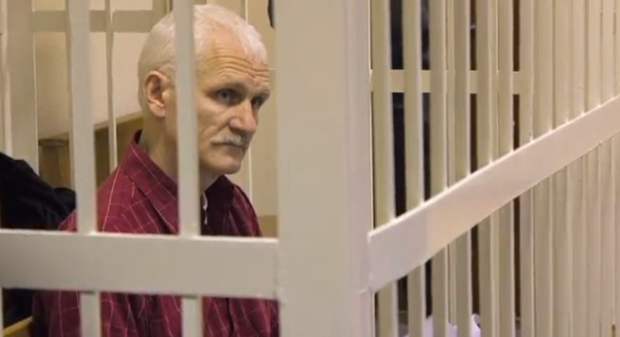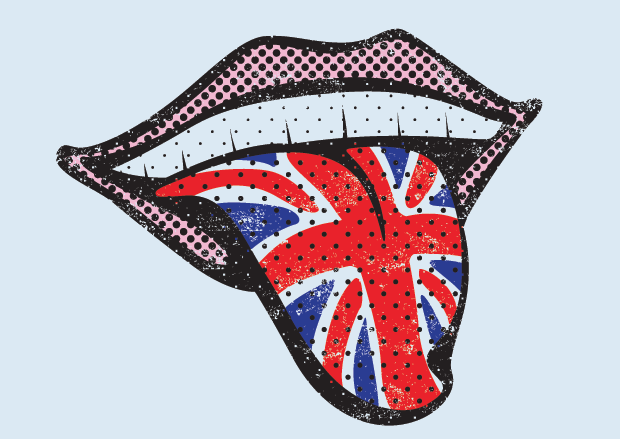10 Jan 2014 | Belarus, News and features

Ales Bialiatski has been imprisoned in Belarus since 2011 (Image: AmnistieWeb/YouTube)
According to Belarusian authorities, a book by political prisoner Ales Bialiatski can “damage the image” of the country.
That was confirmed in a recent letter from the Ashmiany regional customs office to Tatsiana Raviaka, Bialiatski’s colleague from Human Rights Centre Viasna. In July 2013 its officers confiscated 40 copies of Bialiatski’s book “Enlightened by Belarus”, as they were being transferred from Lithuania, where they had been published, to Belarus. Now Raviaka has been told to “re-export the copies of the book to Lithuania” as it has been included on a blacklist of goods that are barred from the territory of the Customs Union of Belarus, Russia and Kazakhstan.
The exact reason for including Bialiatski’s book on the list is not mentioned. After it was first inspected, authorities conclude it could “be harmful for the image of the Republic of Belarus”. However, the State Customs Committee of Belarus itself admitted this justification did not match the legal requirements for a ban, and a second inspection was initiated. The results of this are unknown, besides providing ground for banning the book.
“I am sure the real reason for such close attention to the book is the personality of its author,” Tatsiana Raviaka told Index. “Ales Bialiatski is a well-known human rights defender and he serves a prison term at the moment. Several parts of the book were actually written while he was in prison.”
The actual contents of the book may also play a part in the decision to ban it. “Enlightened by Belarus” is a collection of essays on the history of the Belarusian literature. Before joining the human rights movement he was a post-graduate student at the National Academy of Science and a director of Maksim Bahdanovich literature museum in Minsk. Several essays contain critical assessments of literary works by Belarusian political prisoners, like Uladzimir Niakliaeu and Aliaksandr Fiaduta, written behind bars as they had been arrested after protests on 19 December 2010.
“Ales introduced a notion of ‘Belarusian prison literature’. In fact his book points out that for decades writers in Belarus have been persecuted and put in prisons, from the times of the Czar Russia and Soviet repression, to present day,” says Tatsiana Raviaka, adding that the state censors cannot allow free distribution of the views on the literary process presented in Bialiatski’s book. She and her colleagues from Human Rights Centre Viasna are going to appeal the ban.
Ashmiany regional customs office is known for its close attention to “dissent literature.” In April 2013 it confiscated a Belarus Press Photo album, which a court later ruled to be “extremist”.
Ales Bialiatski was arrested on 4 August 2011 and later sentenced to four-and-a-half years in prison. Despite charges of tax evasion, the country’s civil society and the international community see his prison sentence as punishment for his principled stance in support of human rights in Belarus.
9 Jan 2014 | Africa, Digital Freedom
People in territories controlled by al-Shabab are banned from using “mobile internet and fiber optic technology”, the group announced in a radio message and subsequent written statement on Wednesday. Internet service providers have been given 15 days to comply with the ban.
The country’s two main ISPs, Hortel Inc and Nationlink Telecom, had this morning yet to respond to the demands, reports Al Jazeera English. Details on how such a ban would be effectively implemented and enforced, beyond that those found to be in violation of it would be “considered to be working with the enemy” and “dealt with in accordance Sharia law” were not provided.
While al-Shabab has lost some footing in recent times, especially in urban areas, they still hold control in many rural parts in the country. This is not the first time that control has been used to crack down on access to freedom of expression. Late last year, the group banned use of smart phones and satellite TV. Previously, they have banned BBC radio broadcasts.
This latest moved comes not long after news that Somalia is to get high speed internet from 2014.
9 Jan 2014 | News and features, Politics and Society, United Kingdom

(Illustration: Shutterstock)
The British government’s plans to jail people the courts judge to be persistently ‘annoying’ has been defeated in the Lords – but remains a serious threat to freedom of speech in the UK.
Ministers’ baffling proposals would dramatically broaden the scope of Anti-Social Behaviour Orders (ASBOs). They want to replace these with the so-called Injunctions to Prevent Nuisance and Annoyance (IPNAs), which could still become law if ministers hold their guns when the legislation returns to the Commons later this year.
But right now the broad coalition of campaigners who have fought Clause 1 of the Anti-social Behaviour, Crime and Policing Bill are celebrating after the Lords last night decisively backed an amendment reversing the change.
The debate revealed just how extraordinarily blasé the government’s attitude to the reforms is. Rapidly lowering the threshold needed for an injunction will, ministers hope, make it harder for groups of miscreant youths to dodge having an ASBO slapped on them. What has left so many people really shocked is their inability to realise doing so would have terrible consequences for free speech.
Instead of only being applicable where a person or group causes or threatens to cause “harassment, alarm or distress”, the new injunction ministers were proposing to introduce was supposed to apply to all behaviour deemed “capable of causing nuisance or annoyance”.
It sounds laughable – and it is. Yesterday’s debate saw peers point out all kinds of behaviour which could be included in this definition, from smoking at a bus stop to handing out flyers to winding up the fan of a struggling football club. Carol-singers, bell-ringers, buskers, canvassers, trick-or-treaters, clay pigeon shooters, nudists: All would be affected because they would all be guilty of behaviour which could “reasonably be expected to cause” annoyance.
Those who repeatedly defy an injunction handed down by the courts, who many believe would have little option but to interpret the law more broadly than the government would like, would end up in jail.
Worst of all for our democracy, political protests would become much more vulnerable to being broken up by police under the changes.
“I suppose there are some in this House who might not have attended a demonstration or march,” Baroness Mallalieu told peers yesterday, “but I would wager they are in a minority.” She was talking about the kind of protest which irritates others because of delayed traffic, or the loud chanting, or the time taken off work. These would obviously fall under the scope of the changes. The baroness was not the only peer to quote Lord Justice Sedley’s ruling in a 1997 high court case, when he declared: “Freedom to only speak inoffensively is not worth having.”
There are further fears about the changes, too. Applications for IPNAs can only be made via agencies of the state, like the police or local authorities or government departments. Some believe vexatious obsessives would bombard them with demands for an injunction until they got their way.
Others think the change would result in people being moved on by police officers before the cases ever got to the courts. Ian Blair, the former Metropolitan police commissioner, recalled being on duty in Soho when a local resident demanded steps be taken against a man leafleting. “My Auntie Mabel is annoying,” Blair remembered his colleague saying, “but I’m not going to arrest her just for it.” His fear is that changing the word would lead to countless examples of police officers taking a different attitude in the future. They would go for the path of least resistance by breaking up all kinds of activity which has nothing to do with harassment and everything to do with freedom of speech. “This,” Blair summed up, “is a piece of absolutely awful legislation”.
The defeat which followed was a big one, by 306 votes to 178. But the government’s hold over the Lords is not that strong and since 2010 there have been over 80 such defeats. Ministers could simply reinsert the clause back into the bill when it returns to the Commons – meaning campaigners may have won this battle, but could still lose the war.
The Home Office’s official line, from crime prevention minister Norman Baker, is: “The bill was never intended to ban noisy children or carol singers and does not do so as currently drafted. I am disappointed the Lords fell for what appear to be scare stories.”
There might just be grounds for optimism, even though the timing is particularly painful. Next month, it becomes possible once again to insult others without the fear of being arrested for doing so under the Public Order Act 1986. That was a similar outrageous infringement of freedom of speech which is now being reversed after MPs defied the government last year.
Will they repeat that courageous stand to protect this most basic of civil liberties when the government’s attempt to outlaw being ‘annoying’ returns to the Commons? Let’s hope so.
This article was published on 9 Jan 2014 at indexoncensorship.org
9 Jan 2014 | Asia and Pacific, Digital Freedom, News and features, Pakistan

Protest in Hyderabad, Pakistan against the film Innocence of Muslims, which got YouTube blocked in the country (Image: Rajput Yasir/Demotix)
The last year saw Pakistan successfully transferring power from one democratically elected government to another. A norm in many countries worldwide, this was a milestone for Pakistani citizens. However, while a peaceful transition is welcome, there have been few changes in policy making and inclusion of citizens and civil society in due process when it comes to the country’s deteriorating state of cyberspace, digital security and surveillance issues.
Last year proved to be a bumpy ride too for Pakistan. From one ban to another broken promise, the Pakistani internet community really didn’t have much to be happy about. YouTube was first blocked by the previous government in September 2012 after a blasphemous movie named “The Innocence of Muslims” was uploaded, and remained blocked as of 31 December 2013.
In January, a Pakistan daily reported that the Pakistan Telecommunication Authority (PTA) and the Ministry of Information Technology (MoIT) were planning to install a regulatory system, reportedly imported from China, to monitor websites, online content and also internet filtration. Throughout the year, officials tried to systemize online content filtering mechanism, especially getting a boost after the YouTube fiasco.
A further blow came when Vimeo, another video sharing site, was found to be inaccessible in the country. In May, a band released a satirical song criticising military generals. The lyrics made fun of the army hitting out at their intolerance and corruption: When pockets are full/all the strings are theirs to pull/If it’s one of them you give a naughty look to/very soon you will disappear from view. The video was uploaded on Vimeo and went viral, and in turn led to the site being blocked.
On 2 June, a plethora of users found Tumblr inaccessible in some regions of Baluchistan and Sindh. That same month, an extensive report by Citizen Lab found the Pakistani government to be using the technology from Canadian company Netsweeper, along with DNS tampering, for political and social filtering.
Another ban appeared to have been imposed when Viber users started complaining about not being able to make calls. Viber is an app that supports text messaging and Voice-over Internet Protocol (VoIP) for making free internet calls. Tribune Pakistan recorded complains from around the country including from Karachi, Hyderabad, Multan, Rawalpindi, Faisalabad, and Gujranwala.
Freedom House released its annual “Freedom on the Net” Pakistan country report in October. Among the 60 researched countries, the report placed Pakistan in bottom 10 for its privacy and surveillance concerns. According to this report, at least three cybercafés and mobile phone stores were attacked by religious extremist on moral grounds — something the Pakistani government has yet to fight against.
November brought quite depressing news when a young boy was accused of blasphemy for allegedly sharing objectionable content on Facebook. This was the first time social media was used as a evidence and set a dangerous precedent in a country without any cyber laws. November also saw the Internet Movies Database (IMDb) blocked in the country after Internet Service Providers (ISPs) received a directive from the state. Following online outcry against the ban, it was reversed after only a couple of days.
This was soon followed by Pakistan’s very first case of selective blocking, where the government managed to target specific pages rather than entire platforms. On 25 November, 2013, users across the country reported the inaccessibility of Baloch movie “The Line of Freedom”. The government has time and again tried to use any and all sorts of means to curb dissidents’ views, especially those from the Baluchistan province. While IMDb, Vimeo and other sites remained accessible, the pages of the aforementioned movie were blocked.
Instead of removing the ban on YouTube after having a successful test case of selective blocking, the Pakistani government is currently in talks with Google, Inc. to localise YouTube in the country. This will empower the government to more frequently and easily ban any material that it deems unfit for the nation without ever taking citizens’ views into account.
If anything, the year 2013 only brought despair and hopelessness to Pakistan’s growing number of internet users. From one step to another, the new democratically-elected government is using draconian censorship and surveillance means and systems, affecting the rich exuberance of the country’s online community.
This article was originally posted on 8 Jan 2014 at indexoncensorship.org



